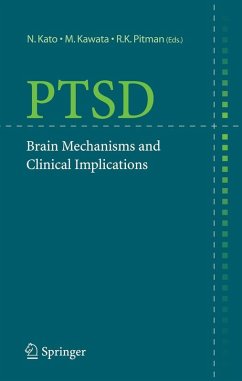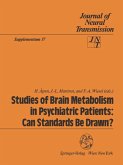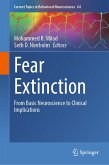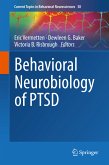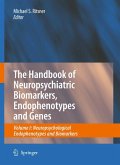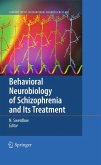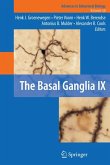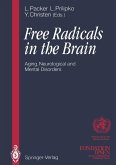PTSD (eBook, PDF)
Brain Mechanisms and Clinical Implications
Redaktion: Kato, N.; Pitman, R. K.; Kawata, M.
113,95 €
113,95 €
inkl. MwSt.
Sofort per Download lieferbar

57 °P sammeln
113,95 €
Als Download kaufen

113,95 €
inkl. MwSt.
Sofort per Download lieferbar

57 °P sammeln
Jetzt verschenken
Alle Infos zum eBook verschenken
113,95 €
inkl. MwSt.
Sofort per Download lieferbar
Alle Infos zum eBook verschenken

57 °P sammeln
PTSD (eBook, PDF)
Brain Mechanisms and Clinical Implications
Redaktion: Kato, N.; Pitman, R. K.; Kawata, M.
- Format: PDF
- Merkliste
- Auf die Merkliste
- Bewerten Bewerten
- Teilen
- Produkt teilen
- Produkterinnerung
- Produkterinnerung

Bitte loggen Sie sich zunächst in Ihr Kundenkonto ein oder registrieren Sie sich bei
bücher.de, um das eBook-Abo tolino select nutzen zu können.
Hier können Sie sich einloggen
Hier können Sie sich einloggen
Sie sind bereits eingeloggt. Klicken Sie auf 2. tolino select Abo, um fortzufahren.

Bitte loggen Sie sich zunächst in Ihr Kundenkonto ein oder registrieren Sie sich bei bücher.de, um das eBook-Abo tolino select nutzen zu können.
This book breaks new ground by offering neuroscientific insights into post-traumatic stress disorder (PTSD). PTSD has emerged as the model mental disorder for studying the effect of the environment on human biological systems, especially the brain. The authors - who range from skilled basic scientists to experienced diagnosticians and therapists - are leaders in the recent surge of biological investigation into this distressing and disabling condition.
- Geräte: PC
- ohne Kopierschutz
- eBook Hilfe
- Größe: 16.66MB
Andere Kunden interessierten sich auch für
![Studies of Brain Metabolism in Psychiatric Patients: Can Standards Be Drawn? (eBook, PDF) Studies of Brain Metabolism in Psychiatric Patients: Can Standards Be Drawn? (eBook, PDF)]() Studies of Brain Metabolism in Psychiatric Patients: Can Standards Be Drawn? (eBook, PDF)40,95 €
Studies of Brain Metabolism in Psychiatric Patients: Can Standards Be Drawn? (eBook, PDF)40,95 €![Fear Extinction (eBook, PDF) Fear Extinction (eBook, PDF)]() Fear Extinction (eBook, PDF)137,95 €
Fear Extinction (eBook, PDF)137,95 €![Behavioral Neurobiology of PTSD (eBook, PDF) Behavioral Neurobiology of PTSD (eBook, PDF)]() Behavioral Neurobiology of PTSD (eBook, PDF)137,95 €
Behavioral Neurobiology of PTSD (eBook, PDF)137,95 €![The Handbook of Neuropsychiatric Biomarkers, Endophenotypes and Genes (eBook, PDF) The Handbook of Neuropsychiatric Biomarkers, Endophenotypes and Genes (eBook, PDF)]() The Handbook of Neuropsychiatric Biomarkers, Endophenotypes and Genes (eBook, PDF)113,95 €
The Handbook of Neuropsychiatric Biomarkers, Endophenotypes and Genes (eBook, PDF)113,95 €![Behavioral Neurobiology of Schizophrenia and Its Treatment (eBook, PDF) Behavioral Neurobiology of Schizophrenia and Its Treatment (eBook, PDF)]() Behavioral Neurobiology of Schizophrenia and Its Treatment (eBook, PDF)161,95 €
Behavioral Neurobiology of Schizophrenia and Its Treatment (eBook, PDF)161,95 €![The Basal Ganglia IX (eBook, PDF) The Basal Ganglia IX (eBook, PDF)]() The Basal Ganglia IX (eBook, PDF)258,95 €
The Basal Ganglia IX (eBook, PDF)258,95 €![Free Radicals in the Brain (eBook, PDF) Free Radicals in the Brain (eBook, PDF)]() Free Radicals in the Brain (eBook, PDF)73,95 €
Free Radicals in the Brain (eBook, PDF)73,95 €- -24%11
-
-
This book breaks new ground by offering neuroscientific insights into post-traumatic stress disorder (PTSD). PTSD has emerged as the model mental disorder for studying the effect of the environment on human biological systems, especially the brain. The authors - who range from skilled basic scientists to experienced diagnosticians and therapists - are leaders in the recent surge of biological investigation into this distressing and disabling condition.
Dieser Download kann aus rechtlichen Gründen nur mit Rechnungsadresse in A, B, BG, CY, CZ, D, DK, EW, E, FIN, F, GR, HR, H, IRL, I, LT, L, LR, M, NL, PL, P, R, S, SLO, SK ausgeliefert werden.
Produktdetails
- Produktdetails
- Verlag: Springer Japan
- Seitenzahl: 304
- Erscheinungstermin: 3. Juli 2007
- Englisch
- ISBN-13: 9784431295679
- Artikelnr.: 37412065
- Verlag: Springer Japan
- Seitenzahl: 304
- Erscheinungstermin: 3. Juli 2007
- Englisch
- ISBN-13: 9784431295679
- Artikelnr.: 37412065
- Herstellerkennzeichnung Die Herstellerinformationen sind derzeit nicht verfügbar.
Nobumasa Kato, University of Tokyo, Japan / Mitsuhiro Kawata, Kyoto Prefectual University of Medicine, Kyoto, Japan / Roger K. Pitman, Harvard Medical School, Boston, MA, USA
Part I Basic Mechanism of PTSD and Stress-Related Brain Dysfunctions Neuroanatomical and Molecular Changes in Stress Responses During Early Life: Implications for Stress Disorders Toru Nishikawa, Akeo Kurumaji, Takashi Ito, Asami Umino, and Sumikazu Ishii Cortisol and PTSD: Animal Experiments and Clinical Perspectives E. Ronald de Kloet and Melly S. Oitzl Stress and Corticosteroid Receptors Mitsuhiro Kawata, Mayumi Nishi, Ken-ichi Matsuda, Hirotaka Sakamoto, Cui Honghai, and Takanori Yoshii Stress Vulnerability Induced by Neonatal Isolation and the Disturbance Between the Phosphorylation and Dephosphorylation of CREB Shigeru Morinobu, Seiichi Tsuji, Michihiro Takahashi, David S Russell, Jun Takahashi, Kazuhide Tanaka, Koichiro Fujimaki, Shigeto Yamawaki, Sachiko Endoh, and Masao Endoh Neuroscience of Emotional Memory and Posttraumatic Stress Disorder Shigenobu Kanba, Koutaro Kudo, Naoko Kaneko, Henny Wati, Hironobu Iguchi, and Keiko Takemoto Studies on Pathophysiology of PTSD Using the SPS Model Kazuhisa Kohda, Kunio Kato, and Nobumasa Kato Mechanisms of Lasting Change in Anxiety Induced by Severe Stress Robert Adamec, Jacqueline Blundell, K. Strasser, and Paul Burton Altered Emotional Behaviors in Mammalian Bombesin Receptor Knockout Mice: Implication for the Molecular Pathogenesis of Stress-Induced Psychiatric Disorders in Humans Keiji Wada, Kazuyuki Yamada, Yuko Santo-Yamada, Hiroshi Maeno, Etsuko Wada, and Masayuki Sekiguchi Role of Stress Hormones and the Amygdala in Creating Lasting Memories James L. McGaugh, Benno Roozendaal, and Shoki Okuda Drug Discovery for PTSD: Characterization of an Animal Model of PTSD and PET Imaging of Brain Glucocorticoid Receptor Katsuya Harada, Takahiro Matsuya, Takayuki Yamaji, Yoshihiro Murakami, Akihiko Noda, Hiroyuki Takamatsu, Kazuhiko Osoda, Nobuya Matsuoka, and Shintaro Nishimura Tissue Metabolism of Glucocorticoids: New Controls of Cognitive Function and the Stress Response Jonathan R Seckl Maternal Deprivation in Neonatal Period and Biological Rhythms Ken-ichi Honma, Ayano Yamazaki, Yoshio Ootsuki, Natsumi Noda, and Sato Honma Part II Clinical Implications for PTSD and Perspectives in Psychiatry Current Perspectives on Clinical Studies of PTSD in Japan Yoshiharu Kim Psychosocial and Genetic Susceptibility to Posttraumatic Stress Disorder Min-Soo Lee and Heon-Jeong Lee Intrusion in Women with Breast Cancer Yutaka Matsuoka, Mitsue Nagamine, and Yosuke Uchitomi Earthquake-Related PTSD: A Follow-Up Study in Prevalence, Comorbidity, Quality of Life, and Biological Correlates Tung-Ping Su, Frank Huang-Chih Chou, Wen-Chen Ou-Yang, and Pesus Chou Psychological Consequences for Students Who Survived the Ehime Maru Accident: A 26-Month Follow-Up Study Masaharu Maeda, Takayuki Maruoka, and Hisao Maeda Structural and Functional Neuroimaging in Posttraumatic Stress Disorder Kiyoto Kasai, Hidenori Yamasue, Tsuyoshi Araki, Hideshi Sakamoto, and Nobumasa Kato Functional Neuroimaging Research in Posttraumatic Stress Disorder Israel Liberzon and Brian Martis Functional Abnormality of the Prefrontal Cortex in Posttraumatic Stress Disorder: Psychophysiology and Treatment Studies Assessed by Near-Infrared Spectroscopy Toshiyuki Ohtani and Koji Matsuo Neural Correlates of Symptom Improvement in Posttraumatic Stress Disorder: Positron Emission Tomography Study Hiromasa Tokunaga, Yoshitaka Ikejiri, Hiroaki Kazui, Yoshihiro Masaki, Naoki Hatta, Talant Doronbekov, Masamichi Honda, Naohiko Oku, Jun Hatazawa, Takashi Nishikawa, and Masatoshi Takeda Cognitive Behavior Therapy: Implications from Advances in Neuroscience Richard A. Bryant Pharmacological Interventions for Posttraumatic Stress Disorder Murray B. Stein Secondary Pharmacological Prevention of PTSD: Therapeutic Implications of a Translational Model Roger K. Pitman
Part I Basic Mechanism of PTSD and Stress-Related Brain Dysfunctions Neuroanatomical and Molecular Changes in Stress Responses During Early Life: Implications for Stress Disorders Toru Nishikawa, Akeo Kurumaji, Takashi Ito, Asami Umino, and Sumikazu Ishii Cortisol and PTSD: Animal Experiments and Clinical Perspectives E. Ronald de Kloet and Melly S. Oitzl Stress and Corticosteroid Receptors Mitsuhiro Kawata, Mayumi Nishi, Ken-ichi Matsuda, Hirotaka Sakamoto, Cui Honghai, and Takanori Yoshii Stress Vulnerability Induced by Neonatal Isolation and the Disturbance Between the Phosphorylation and Dephosphorylation of CREB Shigeru Morinobu, Seiichi Tsuji, Michihiro Takahashi, David S Russell, Jun Takahashi, Kazuhide Tanaka, Koichiro Fujimaki, Shigeto Yamawaki, Sachiko Endoh, and Masao Endoh Neuroscience of Emotional Memory and Posttraumatic Stress Disorder Shigenobu Kanba, Koutaro Kudo, Naoko Kaneko, Henny Wati, Hironobu Iguchi, and Keiko Takemoto Studies on Pathophysiology of PTSD Using the SPS Model Kazuhisa Kohda, Kunio Kato, and Nobumasa Kato Mechanisms of Lasting Change in Anxiety Induced by Severe Stress Robert Adamec, Jacqueline Blundell, K. Strasser, and Paul Burton Altered Emotional Behaviors in Mammalian Bombesin Receptor Knockout Mice: Implication for the Molecular Pathogenesis of Stress-Induced Psychiatric Disorders in Humans Keiji Wada, Kazuyuki Yamada, Yuko Santo-Yamada, Hiroshi Maeno, Etsuko Wada, and Masayuki Sekiguchi Role of Stress Hormones and the Amygdala in Creating Lasting Memories James L. McGaugh, Benno Roozendaal, and Shoki Okuda Drug Discovery for PTSD: Characterization of an Animal Model of PTSD and PET Imaging of Brain Glucocorticoid Receptor Katsuya Harada, Takahiro Matsuya, Takayuki Yamaji, Yoshihiro Murakami, Akihiko Noda, Hiroyuki Takamatsu, Kazuhiko Osoda, Nobuya Matsuoka, and Shintaro Nishimura Tissue Metabolism of Glucocorticoids: New Controls of Cognitive Function and the Stress Response Jonathan R Seckl Maternal Deprivation in Neonatal Period and Biological Rhythms Ken-ichi Honma, Ayano Yamazaki, Yoshio Ootsuki, Natsumi Noda, and Sato Honma Part II Clinical Implications for PTSD and Perspectives in Psychiatry Current Perspectives on Clinical Studies of PTSD in Japan Yoshiharu Kim Psychosocial and Genetic Susceptibility to Posttraumatic Stress Disorder Min-Soo Lee and Heon-Jeong Lee Intrusion in Women with Breast Cancer Yutaka Matsuoka, Mitsue Nagamine, and Yosuke Uchitomi Earthquake-Related PTSD: A Follow-Up Study in Prevalence, Comorbidity, Quality of Life, and Biological Correlates Tung-Ping Su, Frank Huang-Chih Chou, Wen-Chen Ou-Yang, and Pesus Chou Psychological Consequences for Students Who Survived the Ehime Maru Accident: A 26-Month Follow-Up Study Masaharu Maeda, Takayuki Maruoka, and Hisao Maeda Structural and Functional Neuroimaging in Posttraumatic Stress Disorder Kiyoto Kasai, Hidenori Yamasue, Tsuyoshi Araki, Hideshi Sakamoto, and Nobumasa Kato Functional Neuroimaging Research in Posttraumatic Stress Disorder Israel Liberzon and Brian Martis Functional Abnormality of the Prefrontal Cortex in Posttraumatic Stress Disorder: Psychophysiology and Treatment Studies Assessed by Near-Infrared Spectroscopy Toshiyuki Ohtani and Koji Matsuo Neural Correlates of Symptom Improvement in Posttraumatic Stress Disorder: Positron Emission Tomography Study Hiromasa Tokunaga, Yoshitaka Ikejiri, Hiroaki Kazui, Yoshihiro Masaki, Naoki Hatta, Talant Doronbekov, Masamichi Honda, Naohiko Oku, Jun Hatazawa, Takashi Nishikawa, and Masatoshi Takeda Cognitive Behavior Therapy: Implications from Advances in Neuroscience Richard A. Bryant Pharmacological Interventions for Posttraumatic Stress Disorder Murray B. Stein Secondary Pharmacological Prevention of PTSD: Therapeutic Implications of a Translational Model Roger K. Pitman
